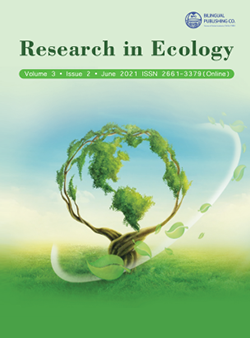
Effects of Chemical Mutagen (Sodium Azide) on Onion Grown in Organic and Inorganic Fertilized Soil
DOI:
https://doi.org/10.30564/re.v3i2.2908Abstract
The effects of chemical agent (Sodium Azide) on Onion growing in organic and inorganic fertile soil was to be examined during this study. The analysis work was carried out within the green house of the research laboratory technology of the Oke Ogun Science Laboratory Technology, Saki, Oyo State. Onion seeds were soaked inside different beakers containing the mixture of Sodium Azide and water mixed with 10 ml of Phosphate solution for 4 hours. Also, the control was soaked with normal water and 10 ml of Phosphate buffer solution. The treated seeds of onions was planted in plastic containers containing 4.2 g of weighed humus soil within the green house at the Department of research lab Technology of The Oke Ogun polytechnic school, Saki Oyo State. The samples parameter were taken daily for six consecutive months. The result obtained was additionally subjected to statistical analysis by using DMRT techniques. The results showed that the stem length was ranged from 11.39±0.62 and 9.98±0.52 with sample of onion without sodium Azide and inorganic had the highest stem length values and samples of onion with Sodium Azide and inorganic had very cheap stem length. However, the leave length ranged from 29.63±0.12 and 22.45±0.10 with the Onion samples with inorganic and Organic fertilizers which had the highest leave length and sample of onion without Sodium Azide was very low leave length. The results of this study showed that each one the parameters studied within the plant were low with Sodium Azide treatment. The decrease in plant growth, plant heights, root lengths, and Phaonerogam survival, fruit yield per plant and height at maturity with agent concentration. It is hereof suggested that Sodium Azide (NaN3) was expected to produce mutation in onion that area unit extremely liable to harmful pathogens and making them cheap to be useful for farmers.
Keywords:
Agent; Solution; Green house; Sodium Azide; Vulnerable; PhaonerogamReferences
[1] McNeal, A., Kosturkova, G. & Mihov, M. (2010). Enrichment of Pisum sativum gene resources through combined use of physical and chemical mutagens.Israel Journal of plant sciences, 49(4):279-284.
[2] Paven Blanco C, Aarts MG, Bentsink L, Keurentjes JJ, Reymond M. What has natural variation taught us about plant development, physiology, and adaptation? The Plant Cell. 2009;21: 1877-1896.
[3] Abd El-Samad, Munir F, Ayub CM, Basra SMA, Hameed A, et al. (2013) Ethanol priming: an effective approach to enhance germination and seedling development by improving antioxidant system in tomato seeds. Acta Sci Pol Hortorum Cultus 12: 129-137.
[4] Maluszynski, E.M. and El-Beik, A.K. (2000). Relationship between growth, yield and storability of onion (Allium cepa L.) with fertilization of nitrogen, sulphur and copper under calcareous conditions. Research. Journal of Agriculture and Biological Science, 5(4):361-171.
[5] Stadler, A. (2009). Induced mutation process as a source of new Mutants. Onion Genetics Cooperation newsletter, 60:70-71.
[6] Crama, O.P and Hevey, K.O (2009): Grafting Techniques for Watermelon.HS1075, IFAS, University of Florida. 3-6pp.
[7] Kirtane, A. Jilani, M.S. Khaliq G. and Waseem, K. (2000). Effect of different NPK levels on the growth and yield of three onion varieties. Asian Journal of Plant Science, 2 (3):342-346.
[8] Maruyama JP, ShennanC,Grattan SR. Developmental changes in tomato fruit composition in response to water deficit and salinity. Physiol. Plant. 2001;83:117-185.
[9] Adamu, A. K., Oluranju, P. E., Bate, J. A., and Ogunlade, O. T. (2002): Radio-sensitivity and effective dose determination in groundnut (Arachishypogaea L.) irradiated with gamma-rays. Journal Agriculture and Environment3 (1): 17-84.
[10] Sheeba, A., Kosturkova, G. & Mihov, M. (2005). Enrichment of Pisum sativum gene resources through combined use of physical and chemical mutagens. Israel Journal of plant sciences, 49(4):279-284.
[11] Sheeba T, Ariizumi T, Okabe Y, Asamizu E, d Hiwasa-Tanase K.TOMATOMA: A novel tomato mutant database distributing Micro-Tom mutant collections. Plant and Cell Physiology. 2005;52: 283-296.
[12] Perveen A, Gbate M, ANUmar. Medicinal and Economic Plants of Nupeland. Jube-Evans books and publications, Bida, Niger State. 2015.




 Adeoti O.M.
Adeoti O.M.





